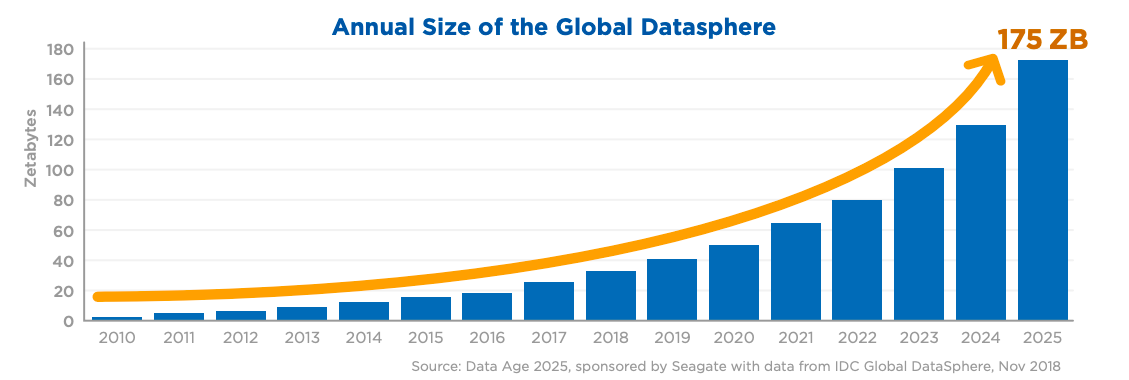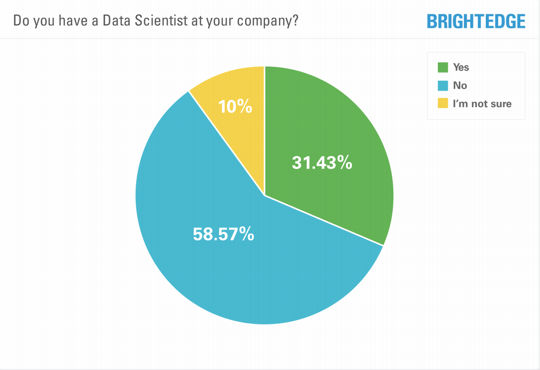The global datasphere will grow from 33 zettabytes (each equal to a trillion gigabytes) in 2018 to 175 ZB by 2025.
In marketing, our role as the stewards of much of this data is growing, as well.
As of last year, more data is being stored in the enterprise core than in all the world’s existing endpoints, according to a report by IDC.

The great challenge for marketers and SEO professionals is activating and using that data.
In 2025, each connected person will have at least one data interaction every 18 seconds and nearly 30% of the world’s data will need real-time processing.
There’s no way human marketers can handle this processing on our own.
And more and more, as our machine-learning-enabled tools process and analyze search data, they’re learning and improving their understanding of it as they go.
Machine Learning in Search
Perhaps the best-known use of machine learning in search is Google’s own RankBrain, an algorithm that helps the search engine better understand the relevance and context of – and the relationship between – words.
Machine learning enables Google to understand the idea behind the query.
Machine learning allows the algorithm to continuously expand that understanding as new words and queries are introduced.
And as algorithms get better at determining which content best meets the needs of each searcher, we are being challenged to create content that meets those needs – and to optimize it so that relevance is clear.
It’s no coincidence that as we’re experiencing this explosion in data, interest in SEO is growing, as well.
SEO & Data Science
SEO has grown to be a viable, respectable mainstream marketing career.
As I write this, there are 823,000 people on LinkedIn with “SEO” in their profile and 8,600 who specifically categorize their core service offerings as SEO.
Looking worldwide, those figures balloon to 3.2 million and 25,000, respectively.
But this is just a small sampling of the SEO industry.
There are those in SEO who identify as content marketers, digital marketing strategists or practitioners, site developers, analytics pros, consultants, advisors, and more.
Our industry is massive in size and scope, as SEO now touches nearly every aspect of the business.
So much more is being asked of SEO professionals now, thanks to that massive increase in data we have to deal with.
Yet according to our research at BrightEdge, only 31.5% of organizations have a data scientist at their company.

Working alongside machine learning rather offers tech-savvy SEO professionals a number of important advantages.
1. Enhanced Performance in Your Field of Specialization
Employers and clients alike are driven by results.
Do you know how to use the machine-learning-powered tools in your area of specialization?
Whether in paid search, technical SEO, content creation and optimization, link building or some other facet of SEO, those who can prove superior performance through the use of machine-learning-enabled SEO tools are increasing their own value.
2. Start Ahead & Stay Ahead
Search is a live auction. If you’re waiting to see what customers think and only then getting ready to respond, you’re already behind.
Machine-learning-powered tools enable marketers to activate real-time insights, to personalize and optimize content in the moment for each users’ individual needs.
3. Economies of Scale
You are exponentially more valuable as an SEO practitioner and leader if you can demonstrate the ability to scale your efforts.
The real power of machine learning is in its ability to convert more data than we know what to do with into actionable insights and automated actions that marketers can use to really move the needle.
To do that is hard.
For example, to build BrightEdge Autopilot we had to process over 345 petabytes of data over the course of many years to help fine-tune machine learning and automated products.
Machines aren’t angling for a promotion; they don’t harbor preconceptions or care about past mistakes.
They are entirely subjective, taking opinions and personalities and other potential bottlenecks out of the process of data evaluation.
What marketers are left with are pure, accurate data outputs that can then be activated at scale to improve search visibility and interactions with customers.
4. Room to Grow
Mastering your SEO toolset gives you more room to grow in your profession, and as a person who just so happens to love the work you do.
Machine learning, in particular, empowers us to reap insights from larger datasets and gives us access to far more intelligence than when we could only learn from that we manually analyzed ourselves.
It is your specialized insight and industry knowledge that determines which outputs are useful and how they should be applied.
Machine learning can tell you very quickly how your audience’s behaviors have changed during a major market disruption, such as our recent experience with COVID-19.
But how you interpret and respond to those changes is still very much the domain of marketing and SEO professionals.
Machine learning can help you recognize patterns in visitor behavior that point to opportunities and areas in need of improvement.
What technology cannot do is replace the creative and analytical human thought process and experience that determines the best next steps to take in response to those insights.
The people of SEO cannot be replaced. In fact, they’re more important than ever.
The tools we use may be quite sophisticated; machine-learning-enabled tools can even make decisions and implement optimizations.
However, it is the people of SEO who drive the creative and analytical processes that machines simply cannot replace:
- Creative analysts.
- Data scientist (who control input into machines).
- Analytics.
- Content producers.
- Culture builders and success evangelists.
- Expert users who facilitate sales and help customers.
- Strategic planning across digital channels.
And there are agile marketers who may do any combination of the above.
They are key in facilitating collaboration with other digital departments to ensure a truly holistic SEO strategy.
In their HBR article Collaborative Intelligence: Humans and AI Are Joining Forces, H. James Wilson and Paul R. Daugherty explain the three key roles humans undertake in every interaction with machine-learning-powered technology:
- Train: We need to teach the machine to perform certain tasks.
- Explain: We must make sense of the outcome of the task, especially if it is unexpected or counterintuitive.
- Sustain: It is up to us to ensure that the technology is used logically and responsibly.
Applying this lens to our SEO tech, we see these three tenets hold true.
We need to decide which SEO tasks to intelligently automate and give our tools the proper input.
We need to take the output and make sense of it, focusing only on those insights with business-building potential.
We are responsible for ensuring that searcher privacy is protected, that the value of the technology outweighs the cost, and that it is otherwise being made good use of.
You can build your value as an SEO and learn to work more effectively with machine-learning-powered tech by building these skills:
- Data proficiency: According to Stanford researchers, the share of AI jobs grew from 0.3% in 2012 to 0.8% of total jobs posted in the U.S. in 2019. AI labor demand is growing, especially in high-tech services and the manufacturing sector.
- Communication: As the arbiter of so much customer data, it is critical that we communicate key insights and value in ways other department heads and decision-makers can understand.
- Agility: More than a trait or quality, agility is a skill developed through constant experimentation.
Embracing machine learning and automation means building synergy with human creativity and skills.
It can make us more creative and effective by uncovering SEO insights and patterns we would never have recognized otherwise.
It can help us discover new topics, identify content gaps, optimize for specific types of queries and results, and more.
What’s more, it can save vital time on tasks that are too time-consuming, too repetitive and laborious, so we can scale performance.
And as that happens, we develop new skills and progress also as part of a symbiotic relationship between people and technology.
More Resources:
- Real-Time Insight & Real-Time Action in SEO: How Automation Bridges the Gap
- A Practical Introduction to Machine Learning for SEO Professionals
- When to Use Data Science in SEO
Image Credits
All screenshots taken by author, June 2020





